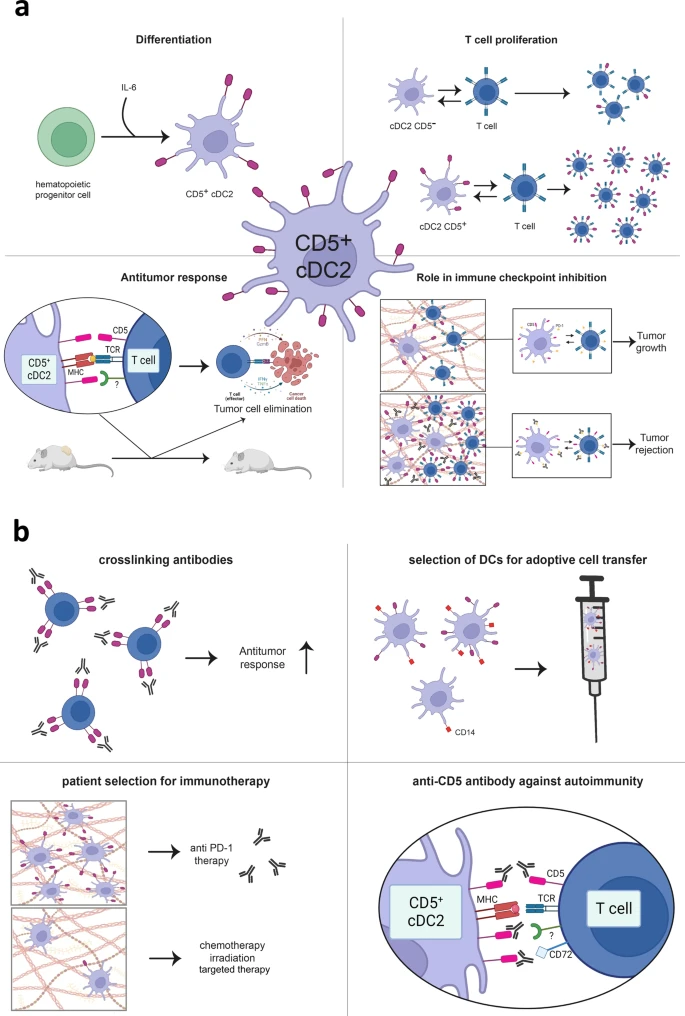Blog Post
Understanding CD5: A Key Player in the Immune System
The immune system is a complex network of cells and proteins designed to protect the body from harmful pathogens. Among its many components are various cell surface markers known as Cluster of Differentiation (CD) markers, which help identify and characterize different immune cells. One such marker is CD5, which plays a crucial role in the regulation and function of immune cells, particularly T cells and B cells. In this blog post, we will explore the significance of CD5, its functions, and its implications in health and disease.
What is CD5?
CD5 is a glycoprotein expressed on the surface of T cells, a subset of B cells (B-1a cells), and thymocytes. It is a member of the scavenger receptor cysteine-rich (SRCR) superfamily and serves as a key regulatory molecule in the immune system. CD5 is involved in modulating immune responses and maintaining the balance between immune activation and tolerance.
Functions of CD5
- Regulation of T Cell Activation: CD5 plays a vital role in fine-tuning T cell receptor (TCR) signaling. It acts as a negative regulator, dampening excessive TCR signaling to prevent overactivation of T cells, which can lead to autoimmune responses. This regulatory function helps maintain immune homeostasis and prevents the development of autoimmune diseases.
- B Cell Function: In B cells, particularly the B-1a subset, CD5 is involved in the regulation of antibody production. B-1a cells are responsible for producing natural antibodies that play a crucial role in early immune responses against pathogens. CD5 helps modulate the activity of these cells, ensuring a balanced antibody response.
- Immune Tolerance: CD5 contributes to the establishment and maintenance of immune tolerance, preventing the immune system from attacking the body’s own tissues. By fine-tuning the activation thresholds of T cells and B cells, CD5 helps prevent autoimmune reactions and maintains self-tolerance.
- Cell Signaling: CD5 is involved in various intracellular signaling pathways. Upon engagement, it interacts with other signaling molecules within the cell, influencing cell survival, proliferation, and differentiation. This makes CD5 a crucial player in the overall regulation of immune cell behavior.
Clinical Implications of CD5
- Autoimmune Diseases: Dysregulation of CD5 expression or function can lead to autoimmune diseases. For example, decreased expression of CD5 on T cells has been associated with autoimmune conditions such as rheumatoid arthritis and systemic lupus erythematosus. Understanding CD5’s role in these diseases could provide insights into potential therapeutic targets.
- Cancer: CD5 is also implicated in certain types of cancer, particularly hematologic malignancies. Chronic lymphocytic leukemia (CLL) and T-cell lymphomas often exhibit abnormal CD5 expression. In these cases, CD5 can serve as a diagnostic marker and a potential therapeutic target. Therapies aimed at modulating CD5 activity could help in the treatment of these cancers.
- Transplantation: CD5’s role in regulating immune responses makes it a potential target in transplantation medicine. Modulating CD5 activity could help prevent transplant rejection and improve graft survival by promoting immune tolerance to the transplanted organ.
Research and Future Directions
Ongoing research is focused on understanding the detailed mechanisms of CD5 signaling and its interactions with other molecules in the immune system. Advances in this field could lead to the development of novel therapeutic strategies for autoimmune diseases, cancers, and transplantation.
Conclusion
CD5 is a critical regulatory molecule in the immune system, involved in modulating T cell and B cell functions, maintaining immune tolerance, and preventing autoimmune responses. Its clinical significance spans autoimmune diseases, cancer, and transplantation medicine. Continued research on CD5 holds promise for new therapeutic approaches that could enhance immune regulation and improve patient outcomes in various diseases.


